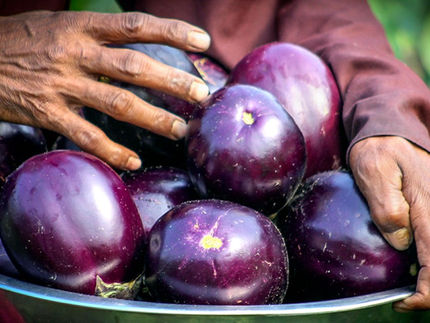Transforming the food system to serve all
Grant of $2.8M from Novo Nordisk Inc. to American University to address food security in D.C.’s Wards 7 and 8
health happens where people work, live, play and worship, says Prof. Stacey Snelling, chair of the Department of Health Studies in American University’s College of Arts and Sciences. And that’s where the Healthy Schools, Healthy Communities Lab engages children, adults and older adults to tackle health inequities. Snelling received a three-year grant of $2.8 million from Novo Nordisk Inc. for health education and to grow the number of Black farmers producing locally grown fruit and vegetables. The goal is to improve local food supply chains and healthy foods options for residents in Wards 7 and 8.
“Obesity, high blood pressure and other chronic ailments that disproportionately affect residents in Wards 7 and 8 show how the food system is not serving all residents in Washington, D.C.,” Snelling said. “Transforming the food system is needed to improve health for all.”
In the United States, 40 million people are food insecure, according to Feeding America. Chronic conditions including obesity, diabetes, hypertension, heart disease and several types of cancer are associated with poor nutrition. According to Community Health Administration at DC Health, Wards 7 and 8 experience the starkest health disparities in the District, and 72 percent of residents are considered obese.
“Novo Nordisk is strongly committed to reducing the burden of chronic disease – and that includes partnering with community-based organizations in underserved communities to improve access to drivers of health and wellness, such as food security,” said Jennifer Duck, vice president of public affairs at Novo Nordisk Inc. “Dynamic programs such as this one have the potential to build a holistically healthier future for the next generation. We couldn’t be more excited to join American University in taking on these challenges in the District of Columbia.”
To expand agriculture and the supply chain, agricultural partners to the grant will create an apprentice and scholarship program for five urban youth every year to advance interest, knowledge and job training for Black and brown farmers. Training on regenerative agriculture practices and the establishment of hydroponic farms and smart greenhouses will take place, as well as a “Food Ambassadors” program of five mobile markets to serve residents and expand the distribution of locally grown produce.
As faith organizations are an important part of African American life in Wards 7 and 8, tapping their social support networks for health promotion and education has shown success. Partnerships with faith organizations will help residents with food assistance, nutrition counseling, and in addressing isolation among older adults through socialization over food.
In Ward 7, for example, Pastor Wil Stroman’s Urban Outreach Ministries is in a food desert of few grocery stores and fresh foods. Stroman, a partner to the Healthy Schools, Healthy Communities Lab, has been working to change this in his community by partnering with the lab to expand his ministry’s offerings. The new grant makes funds available to continue Stroman’s work and engage other faith-based groups.
“Working with new partners and accelerating the work of our existing ones will grow urban agriculture, the distribution of healthy foods, and increase education on healthy eating and disease prevention,” Snelling said.
Most read news
Other news from the department science

Get the food & beverage industry in your inbox
By submitting this form you agree that LUMITOS AG will send you the newsletter(s) selected above by email. Your data will not be passed on to third parties. Your data will be stored and processed in accordance with our data protection regulations. LUMITOS may contact you by email for the purpose of advertising or market and opinion surveys. You can revoke your consent at any time without giving reasons to LUMITOS AG, Ernst-Augustin-Str. 2, 12489 Berlin, Germany or by e-mail at revoke@lumitos.com with effect for the future. In addition, each email contains a link to unsubscribe from the corresponding newsletter.




























































